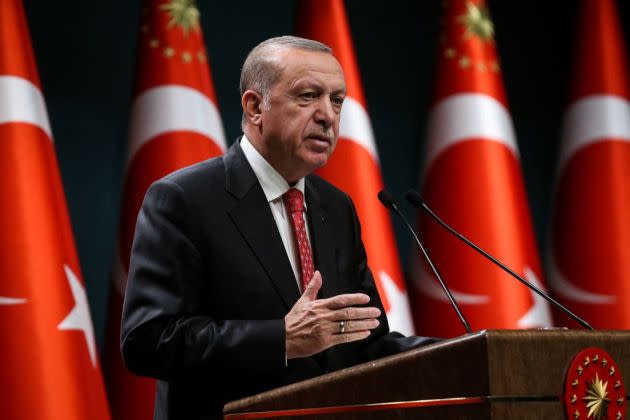Turkish Industry Reacts to Erdogan Hat Trick
- Oops!Something went wrong.Please try again later.

Many of the locals are calling it a hat trick.
President Recip Tayyib Erdogan’s victory in Turkey this week has given him another five years of tenure in the position he has held since 2014. Following the election results, the Turkish lira slid further, to 20.75 lira versus the dollar. The currency has lost 30 percent of its value in 2022 on the heels of a 44 percent decline in 2021.
More from Sourcing Journal
Many foreign investors watching the results were dismayed, noting that recent questionable economic policies have led to a considerable loss of business. With inflation at more than 45 percent in April (down from last year’s high of 85.5 percent) surviving day to day survival has been a challenge.
Unclear of what to expect, industry watchers are looking ahead to the appointment of the new cabinet, expected on Saturday.
Meanwhile, crucial foreign exchange reserves continued to drop. According to an analysis by Reuters, net forex reserves plunged into negative territory on May 19.
Manufacturing and export businesses are expected to be negatively impacted, as erratic policies, and concerns about politically motivated measures weigh on Turkey even as it celebrates 100 years as a republic.
Erdogan’s victory has sent ripples through the business community.
The apparel and textile industry, which exported $32.5 billion worth of goods in 2022, is the sixth largest in the world, and the third largest supplier to the European Union. Having benefited from the near sourcing policies of many brands and retailers during the initial years of the Covid-19 pandemic, Turkey’s apparel and textile exports increased by 16.6 percent from 2020 to 2022.
Fear of losing that business, however, has risen the past two years.
“We need economic policies to be reformed, we want the interest rates and inflation to be brought down,” said Cem Altan, vice-chair, Turkish Clothing Manufacturers Association (TCMA) and president of the International Apparel Federation, told Sourcing Journal.
“We are hoping a strong economic team will take over and will change the attitude to regulate all of these things, so that it can bring more trust for foreign investors. We need more stable and sustainable foreign investments. Also, Turkish people are not investing in the industry at the moment because they can’t see the future. Once trust is created again, we will truly find growth. We are hoping that will happen with the new government,” he said.
In a press statement regarding the presidential elections, Ramazan Kaya, co-chair of the Turkish Clothing Manufacturers’ Association took a similarly forward-looking stance.
“Now it is time to look ahead. In the forthcoming period, we believe that we need to increase our production and exports in order to contribute to the economic and social welfare of our country. We can reduce inflation by producing more, reduce the current account deficit by exporting more, and increase employment with the added value we create,” he said.
“With the completion of the elections, the period of uncertainty has come to an end,” said Mustafa Gültepe, president of TİM, the Turkish Exporters Assembly. “It is now time to focus on our work with all our energy. We are working with the vision of placing Türkiye among the top 10 countries in exports.”
“However, I must emphasize that we are going through a challenging period,” he added, listing out some of the tough situations faced by exporters over the past year. “Despite the significant increase in costs since the beginning of the year, the suppression of the exchange rate has harmed the competitiveness of our exporters. We have started experiencing losses in some markets where we had made great efforts to enter. However, we cannot afford to lose markets. On the contrary, we should be able to demonstrate our presence in new markets with steps that will enhance our competitiveness.”
Others believe that uncertainty will grow with Erdogan back in the president’s seat.
Given that the constitution bars Erdogan from seeking another term, will he now work to strengthen the economy and support the textile sector?
“We are even more hopeful for the new era. We believe that with an economy management that understands production and exports well and is knowledgeable about the dynamics of global trade we can quickly overcome the existing problems,” Gültepe said in a statement.
Many expect former finance minister Mehmet Semsek will be put in charge of economic policy. The cabinet announcement should shed light on the path forward.
Perhaps as industry analysts pointed out, Turkey needs more than investment. It needs urgent action to handle inflation and shore up living conditions.
“We have to make money to invest to look after the workers, otherwise there will be a lot of job losses. During Covid, for instance, we ensured that there were no job losses, and we do our best to make sure of that in all situations. Turkey needs long-term investment to grow. The investment is also important to ensure sustainability, digitalization and greening,” Altan said.
“At the end of the day, we are business people,” Altan added.

